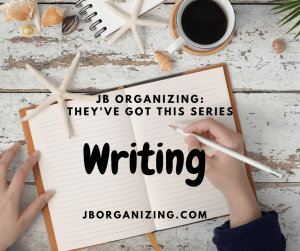You want to write, but don’t know where or how to start…..
You feel like writing is too hard and you could never do it……
You don’t know much about writing at all…..
You know you want to write, but you aren’t sure what type of writing to do…
Keep reading….Our expert will answer these questions and more!

They’ve Got This!
A Writer Gives Us Some Things to Think About
By Published Author
Michelle Markey Butler
(To learn more about Michelle and her books click here)
Our lives are challenging right now. Of course, our lives are always challenging, but for many of us, our usual stress management options aren’t available. So what’s something stress-relieving you can do at home, requires no specialized equipment, is low-cost, and adjusts to anyone’s schedule?
Writing.
What?!? I can hear it now. Writing is a source of stress, not way to relieve it.
I know. Believe me, I know. Writing can be anxiety producing. But it can also reduce stress.
Hang with me here.
Journaling
Memory is funny. If we try to remember, with no clues or prompts, what we were doing, say, on October 15, 2017, usually we can’t. Of course when something striking happens, good or bad, the date is seared into our minds. But most days are ordinary days, blurring together.
When we journal, we provide ourselves a bridge to the past.
I have journals going back twenty years. I no longer have vivid memories of day to day life with toddlers, but fortunately, I have journals. Daily accounts of trying to put a little one to bed, or the unfortunate vomit incident after too much chocolate milk, or how many times child #4 liked to hear “The Very Hungry Caterpillar” provide glimpses to those days.
But journaling’s value isn’t just for the future.
Journaling at the end of the day gives us a time and space to comb out our tangled thoughts.
A way to put them in order, and put them down—both in the sense of on the page and set down and let go. Right now, with most of us having fewer chances to talk with friends, journaling gives us a way to be our own best friend and talk out the difficult parts of our day or be thankful for the pieces that went smoothly.
Journaling is also the form of writing least likely to wake your internal critic.
You’re writing for yourself, so what does it matter how something is phrased? The critic can hit the snooze button. Spending time out from under the inner critic’s eye in another benefit of journaling. Putting words on the page is like any other muscle. The more you practice, the stronger it gets. Journaling provides practice without having to push back against the pesky inner critic who likes to tell us everything we write is terrible and we should just give up.
Journaling is a great form of writing for the present moment.
It helps calm our anxieties. It will help us, later, remember what these days were like. It helps us practice, so we can do it and other forms of writing with less pain.
Non-fiction
We often hear “write what you know.” While that’s not bad writing advice, it’s not great either. It implies you can only write from personal experience and there’s something unsavory about researching for a project. Of course, our lived experiences affect our writing. But that doesn’t mean we must only restrict ourselves.
Writing non-fiction offers stress relief in part because it nearly always requires research and the chance to learn something new.
With our busy lives, most of us do not often have the opportunity to learn something new. So if we volunteer to write an article about later school start times for the PTA newsletter, a blog post about a recent discovery in local history, a list of great new chapter books for a moms’ group, a letter to the editor about a proposed bypass, we commit to learning what is required for that project. I’m part of the True Crime Medieval podcast team. Every two weeks, I research a new murder, poisoning, or theft in the Middle Ages. It’s challenging, but also invigorating.
Learning something new, or learning more about a topic, helps keep our brains flexible, but it also provides us with a path away from the atmosphere of contagious anxiety most of us currently swim in. Stepping away from our problems doesn’t make them go away. But giving ourselves time to think about something else lets us come back better able to face them.
Writing non-fiction can be more stressful than journaling, since we usually write things we have agreed to let someone else read.
But often we can keep the voice of these works impersonal, the focus on the topic. Even when we write about controversy, we can usually discuss it journalistically. This doesn’t eliminate our incessant inner critic, but it can help tune out that voice.
If we write about topics we have come to know deeply, and care about passionately, sharing that knowledge and passion can be rewarding and relaxing.
Thus taking some time to write non-fiction can help ease stress by learning something new or deepening our understanding of a subject, by giving us time away from the constant pressure of the moment, and by sharing that information with others.
Fiction and Poetry
Without a doubt, creative works can be stressful to produce. Our inner critic tends to yell loudly.
Even so, many people find this type of writing reduces anxiety. Fiction brings the additional benefit of taking us out of our own world for a time.
J.R.R. Tolkien talks about fantasy in his essay “On Fairy-stories.” According to Tolkien, one benefit of fiction, and in particular fantasy, is recovery. We might expect him to mean fiction helps us feel better—and it does, but that’s not what he’s getting at. Rather, spending time in an imagined world enables us to better see the real world. That is, we recover the ability to see clearly. He compares this to cleaning the windows of a house. We tend to find this recovery relaxing, as now we see what’s really around us, not what we’re afraid is there.
In his essay Tolkien discusses reading, but of course also writing. He knew better than most the benefit of spending time in an imagined elsewhere. This is a gift we can give ourselves as well. It need not be as developed as Middle-earth, with its own creation story, thousands of years of history, and four invented languages. (But hey, if that floats your boat, go for it.) It need not be fantasy at all. Fictional versions of the real world…are still fiction. They are also otherworlds. Just ones with a resemblance to this one.
Spending time creating a kinder, or more exciting, or more just, or more trustworthy, fictional world not only helps us see the world we actually live in more clearly, it helps us see the potential for making that real world a better place.
For many people, the uncertainty and bitterness of our current moment is, naturally enough, stressful. It’s easy to become discouraged. Imagining a better world through fiction or poetry can help us believe it is possible to make the real world better too. Feeling like we have the power to improve the world reduces anxiety by reducing our feelings of helplessness.
Conclusion
The creative process, any sort of creative process, from knitting to sketching to whittling, tends to lower stress, and it does so—and this piece is crucial—whether or not we are good at it. I have focused here on writing, since that’s my jam, but if it’s not yours, that’s okay. But if you want to try it out, go ahead. But remember, when the inner critic starts up: we do not have to be good at writing for writing to be good for us.
While all creativity helps us manage the anxieties of being human, I think writing is particularly good at doing so because it puts us in touch with the building blocks of language and meaning.
It’s a kind of magic. All our books are built by rearranging the same 26 letters. In the early Middle Ages, reading and writing was considered almost literally magic. After all, you kill a sheep, skin it, dry the skin, then stain it in patterns with special water—and through that, the thoughts of people could be preserved long after their deaths. Of course it seemed a wonder.
That wonder survives in modern English. ‘Spell’ means create magic but also create words.
